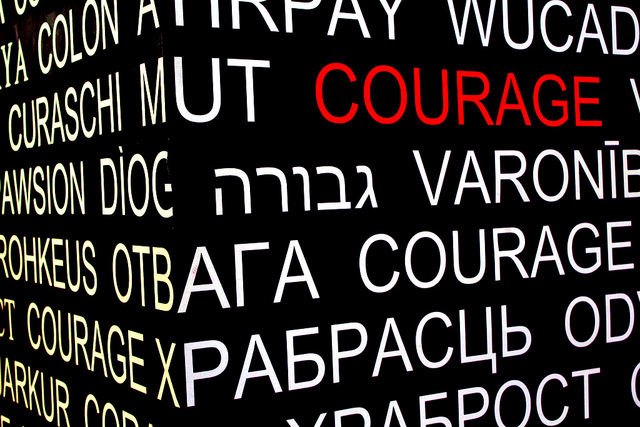 Photo Credit: quinn.anya
Photo Credit: quinn.anya Fear of fear is the most destructive force within us and around us. It is understandable to not want to be afraid. It is uncomfortable at the least and terrifying at its worst. And yet, we human beings have been given the capacity to feel fear for a good reason. The emotion of fear alerts us to danger and releases adrenaline for the possibility of extraordinary action, some of which is voluntary, such as running away or fighting, and some of which is involuntary, such as increased heart rate or a bowel movement to decrease weight. All of this was crucial for us to get away from those saber-toothed tigers and is still crucial for our survival today. Fear is still the messenger that says: “This person or this circumstance is potentially harmful. Do not go near.”
However, a lot of us run away from the very emotion that would alert us to danger instead of running away from the danger itself. There are many reasons for it. Some of us have learned to ignore fear during childhood because we experienced so much of it that it was easier to numb ourselves emotionally. The consequence is that we walk through adult life still ignoring scary situations. Others among us are so cuddled in all the creature comforts we enjoy today that we have become utterly unaccustomed to tolerating the discomfort of fear. In its most extreme form this ignorance or intolerance of fear needs an addiction (or two or three) to keep away any possibility of connecting to what is truly going on inside.
The task at hand is to welcome our fears and not run away from them. If we encounter our fears with a loving attitude we might find out what they are. Our fears are as individual as our fingerprints. Some of us are afraid of a tiny little spider whereas others can handle tarantulas. Some of us are afraid to cross a bridge whereas others hurdle themselves from high cliffs into the water. Some of us are able to speak in front of huge crowds but are unable to enter an intimate one-on-one relationship, and for others it is the other way around. It does not matter what they are, once we know our fears we can ask some questions: “Is this fear based on reality? If yes, what do I need to do in order to be safe? If no, can I let go of that fear? If I feel unable to let go in the moment, do I want to work on letting go in the future? If yes, what can I do to make that happen?” All these questions lead to some kind of decision and choice that honors our particular way of being.
Of course, some decisions may be simple in theory and appear almost impossible to follow through in reality, as in the example of a battered wife with children and little money earning power who wants to leave her husband but feels she needs to rely on him for survival. Sometimes we may need to ask for a lot of help from others; sometimes we may need to risk being seemingly worse off than we are now to get to where we want to be, a life free of unnecessary fear. In any case, we need to love ourselves first the way we are, warts and all. Then we can work on discarding those aspects that don’t work for us. Fear of fear keeps us needlessly away from who we are, and more importantly, keeps us away from some vital action we might need to take. Our survival depends on it.
About this Contributor: Gudrun Zomerland, MFT is a licensed marriage and family therapist with offices in Santa Rosa and Petaluma, CA. She writes: “I grew up in post-war Germany and moved to the US in my mid-twenties. The exposure to two cultures has given me an appreciation for diversity, its riches and challenges. Because I was affected by the immense destructiveness of war just prior to my birth, I have a particular sensitivity to personal as well as historical trauma and the deep fear, pain, rage and/or guilt some of us carry inside. I find personal self-exploration, interpersonal discovery, artistic expression, a spiritual belief, and humor of utmost importance in people’s achievement of mental health. I see inner well-being as a life-long task.” For more information about Gudrun’s work or to contact her, please visit: http://www.chinnstreetcounseling.com/zomerland/index.shtml
Leave a reply
You must be logged in to post a comment.

Clark Rector, M.A. said on July 20, 2016
Thank you Gudrun.